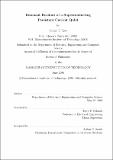Resonant readout of a superconducting persistent current qubit
Author(s)
Lee, Janice C. (Janice Cheng-Yee), 1978-
DownloadFull printable version (10.40Mb)
Other Contributors
Massachusetts Institute of Technology. Dept. of Electrical Engineering and Computer Science.
Advisor
Terry P. Orlando.
Terms of use
Metadata
Show full item recordAbstract
Superconducting Josephson junction devices rank among the best candidates for realizing a quantum computer. While the coherent control of quantum dynamics has been demonstrated in these solid-state, macroscopic quantum systems, a major challenge has been to increase the coherence times for these qubits. With an objective to reduce the level of readout-induced decoherence, this thesis work focuses on a resonant readout scheme developed for a niobium persistent-current (PC) qubit. This non-dissipative readout approach detects the flux state of the qubit by sensing a change in the Josephson inductance of a SQUID magnetometer. By incorporating the SQUID inductor in a high-Q resonant circuit, we distinguished the flux states of the qubit as a shift in the resonant frequency at 300 mK. The nonlinearity due to the Josephson inductance has characteristic effects on the resonant behavior of the readout circuit. We observed novel manifestation of this nonlinearity given the high quality factor of the resonance. The readout circuit was characterized in the linear as well as the nonlinear regime for its potential use as a bifurcation amplifier. Numerical simulations based on Josephson-junction circuits were also performed to understand the observed nonlinearity in the resonant behavior.
Description
Thesis (Ph. D.)--Massachusetts Institute of Technology, Dept. of Electrical Engineering and Computer Science, 2006. This electronic version was submitted by the student author. The certified thesis is available in the Institute Archives and Special Collections. Includes bibliographical references (p. 211-218).
Date issued
2006Department
Massachusetts Institute of Technology. Department of Electrical Engineering and Computer SciencePublisher
Massachusetts Institute of Technology
Keywords
Electrical Engineering and Computer Science.